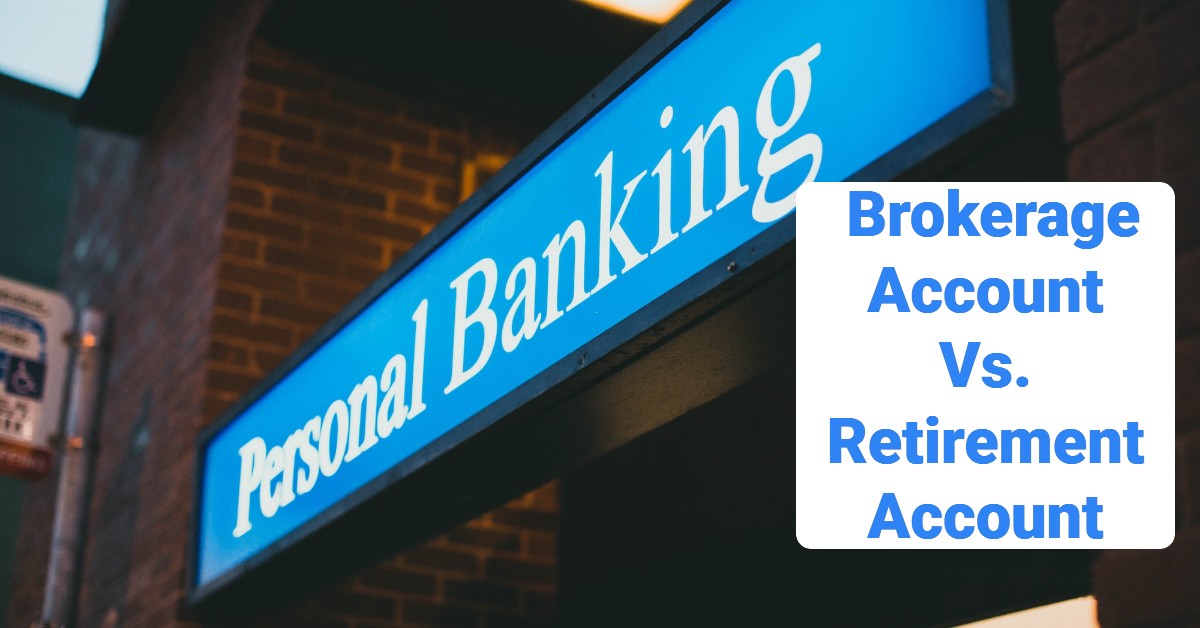Brokerage Account Vs Retirement Account: What’s the difference between a brokerage account and a retirement account? This precise article gives you all the details you need.
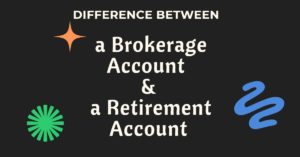
Brokerage accounts and Retirement accounts help one save for retirement. But what are their advantages and disadvantages? Read on.
Difference Between a Brokerage Account and a Retirement Account
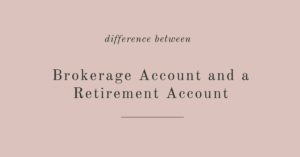
Indeed, Brokerage accounts and Individual Retirement Accounts (IRAs) are two investment tools that can be used to save money when creating a retirement plan.
Brokerage accounts have non-tax-advantage, and opening one gives you access to the stock market, mutual funds, and other securities. Retirement accounts allow you to contribute taxable funds now in exchange for tax-free funds when you retire. Taxes are handled differently for each option, which may make you prefer one over the other.
In general, a brokerage account is used to invest in the stock market, whereas an IRA is used for retirement planning.
What do you need to know about brokerage accounts and retirement accounts to help you make long-term investment decisions? Read below.
What is a Brokerage Account, and How Does it Work?
If you believe that planning for the future entails buying and selling a variety of investments, you should consider opening a brokerage account.
A standard brokerage account is required if you want to invest in the stock market.
A brokerage account is an investment vehicle that allows investors to buy and sell stocks, bonds, exchange-traded funds (ETFs), and a variety of other assets.
Because investments are kept in a brokerage account for a long time, the value of the assets grows over time.
How Brokerage Accounts Work
Brokerage accounts have a distinct advantage over other types of investment accounts in that they allow the account holder to purchase a variety of investments. In addition to domestic stocks, you can invest in international stocks or publicly traded companies that are linked to commodities such as gold and silver.
When deciding what investments to put in your brokerage account, retail investors must consider several factors, including the length of time the money will be invested and their ability to tolerate risk when markets are volatile.
Rather than handling your own day-to-day trading, you can use a brokerage account (also known as a taxable account), which requires you to deposit your money into an account with a licenced brokerage firm. That company will then take your money and invest it in various trades on your behalf. The Internal Revenue Service (IRS) immediately taxes any assets gained when they are sold as capital gains. You can also manage the assets on your own without paying asset management fees.
Brokerage accounts are taxable accounts, but they do provide some tax flexibility.
There are different types of brokerage accounts as well, such as the cash account and margin account.
A cash account requires the investor to pay for any purchased securities immediately, whereas a margin account allows your brokerage firm to lend you money to buy securities. Existing securities in your portfolio are then used as collateral to secure the loan for your portfolio.
Advantages of a Brokerage Account
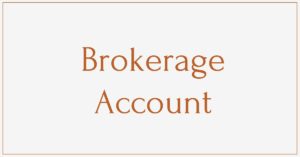
There are numerous reasons why opening a brokerage account to plan for the future may be right for you, just as there are numerous types of brokerage accounts. Here are some of the reasons why people find brokerage accounts appealing:
1. No income requirements or contribution limits.
A brokerage account, unlike retirement plans, does not discriminate between people with very little income and people with large bank accounts. Furthermore, brokerage accounts do not limit the amount of money you can invest in your account.
Almost anything can be invested in. The ease with which you can begin investing is one of the most appealing aspects of opening a brokerage account. You can create a diverse investment portfolio in which to buy and sell stocks, ETFs, mutual funds, and other securities.
2. You can withdraw funds early without repercussions.
Most retirement plans limit when you can withdraw funds from your savings, but nothing prevents you from withdrawing funds from your brokerage account as long as you pay your taxes.
3. No mandatory distributions.
If you have any retirement plans with mandatory distributions, you can easily deposit those required withdrawals into your brokerage account.
The Downsides of a Brokerage Account
While there are many benefits to having a brokerage account, there are some factors to consider before making this decision.
Some of the reasons why you might not want to open a brokerage account are as follows.
1. Returns are not guaranteed.
The stock market can be extremely volatile. There is no guarantee of a return on investment when you put money into the market.
2. Income and capital gains are taxed directly.
Brokerage accounts, unlike most other retirement investment plans, are taxed at nearly every level, including dividends, capital gains, and interest.
Brokerage Account FAQs and Answers
Are there any charges for a brokerage account?
If you open and maintain a brokerage account, you will be charged a variety of fees. These fees include transaction costs such as commissions and markups, as well as any additional fees associated with certain investments.
How does a discount brokerage work?
Discount brokerage firms, such as Charles Schwab, TD Ameritrade, E*TRADE, Vanguard, and Fidelity, offer significantly lower fees than full-service brokerage firms. Lower fees usually come at the expense of fewer services, but investors looking for low-cost investment trades and simple online trading software may find this a reasonable tradeoff.
What is the process of growth in a Roth individual retirement account (Roth IRA)?
The growth rate of your Roth individual retirement account (Roth IRA) is determined by when you begin investing and what you invest in. If you begin early, you will have the advantage of time and compound interest on your side. Even a small contribution, if invested in stocks, mutual funds, or exchange-traded funds, will grow over time (ETFs). Starting later will require more upfront investment to achieve the same results.
Must Read: Difference Between Pound and Quid
What is a Retirement Account, and How Does it Work?
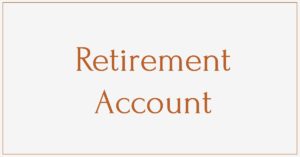
Individual Retirement Accounts (IRAs) are available for your retirement savings and investing.
An Individual Retirement Account (IRA) is an investment vehicle that provides tax benefits for your retirement savings.
It allows your retirement funds to grow compounded, and contributions are not taxed until you withdraw them. This means that earnings in your traditional IRA can grow tax-free. You will pay taxes on your investment returns at the time the money is withdrawn, not at the current tax rate.
Total contributions to IRA accounts in 2022 cannot exceed $6,000. Account holders age 50 and up can contribute up to $7,500.
Aside from traditional IRAs, there are several other types of IRAs:
Roth IRA
Contributions to a Roth IRA are made after-tax. Earnings grow tax-free, and withdrawals are tax-free as long as you are 59.5 years or older and have held the account for five years or more. This allows you to fully benefit from compounding growth over time.
For a Roth IRA, investors can only contribute the full amount if their modified adjusted gross income is less than $129,000 if filing as a single taxpayer or $204,000 if married and filing jointly for the tax year 2022.
Simplified Employee Pension (SEP) IRA
A Simplified Employee Pension IRA is a tax-deferred retirement plan for those who are self-employed.
Savings Incentive Match Plan for Employees (SIMPLE) IRA
Savings Incentive Match Plan for Employees, or SIMPLE IRA, gives employees and employers the chance to contribute to the employee’s traditional IRA.
Note:
Seven things to note about Retirement Accounts:
- There is no income limit for a traditional IRA, although there are contribution limits that depend on income. Whereas brokerage accounts have no restrictions on contributions.
- If you wish to withdraw money from your IRA, you may incur withdrawal penalties when the money is taken out too early.
- In general, with a traditional IRA, you have to wait until the age of 59½ to withdraw money without a penalty, with certain exceptions. Otherwise, you may incur a 10% penalty along with federal and state taxes.
- At age 59½, you can start to withdraw money from your IRA with no penalties but are subject to taxes that may be due.
- You can open an IRA with a bank or a brokerage company.
- Once you open your IRA, be sure to choose investments for your contributions. You can choose mutual funds, exchange-traded funds or individual securities, among many other investments.
- You can open an IRA with any starting amount. But the investments you choose for your account, like mutual funds offered by particular brokerages, may require a minimum deposit.
How a Roth IRA Works
A Roth IRA is a type of individual retirement account that provides tax-free withdrawals in the future in exchange for making after-tax contributions now.
Growth within the IRA is also tax-free and can be started as early as you want, as long as you have qualifying earned income.
Benefits of a Roth IRA
Roth IRAs are popular due to their flexibility and simplicity. Here are some of the reasons why you should open a Roth IRA.
1. Excellent tax benefits.
One of the biggest reasons to use a Roth IRA is the tax benefit that it provides. You don’t pay tax on the earnings on your contributions, and all withdrawals are tax-free after you meet some criteria. Your contributions are yours to withdraw at any time.
2. Zero required minimum distributions (RMDs).
In some retirement plans, you must begin taking money out of your account at a certain age. Roth IRAs do not have this restriction, allowing you to continue growing your investment after retirement.
3. Potential tax diversification if paired with other retirement plans.
Roth IRAs can be combined with other retirement saving plans to diversify how taxes are calculated as money is withdrawn during retirement. Since you’ve already paid taxes on your contributions, any withdrawals from your Roth IRA will not be taxed.
Disadvantages of a Roth IRA
1. Taxes are charged as you deposit funds.
To get the benefit of zero taxes on future withdrawals, your contributions to the Roth IRA are taxed upfront.
2. The maximum contribution level is low.
Depending on how much money you make each year, you may be limited on how much you can contribute. In 2022, the limit is $6,000. Those ages 50 and older can contribute an additional $1,000 as a catch-up contribution.
3. Income limits can hamstring contributions.
Depending on your modified adjusted gross income (MAGI), you may be limited in how much you can contribute to your Roth IRA. Phaseouts start at $204,000 for a married couple filing jointly in 2022. If you and your partner earn $214,000 per year, you cannot contribute anything.
4. The five-year rule.
While you can withdraw contributions from your Roth IRA at any time, you must wait at least five tax years and be at least 59½ years old if you want to do so without incurring taxes or penalties. This is known as the five-year rule.
Pairing a Brokerage Account With an IRA
Investors are not required to choose between a brokerage account and an IRA; they can have both. Each account serves a different purpose, employs different strategies, and produces different results.
Having both an IRA and a brokerage account allows you to focus on both retirement savings and short-term financial goals, such as purchasing a home or a car.
When it comes to retirement savings, IRAs may be a better option than brokerages due to tax advantages. A taxable brokerage account will not provide you with the tax deferral or even tax benefits that an IRA does.
According to experts, you should begin by opening an IRA and then investing in a taxable brokerage account.
When you want to contribute more money than an IRA allows, consider opening a brokerage account. The more money invested, the more likely it is to grow in the long run. Maintaining this practice can lead to a more comfortable transition to retirement.
In conclusion, when it comes to selecting a retirement plan, there are numerous options. If you have to choose between opening a brokerage account and starting a Roth IRA, it should come down to where you are in life and how much you can contribute. You can find the best retirement plan for you with a little research and an understanding of your options.
I hope you found this difference between a Brokerage Account and a Retirement Account article helpful.
Let us know your thoughts in the comment section below.
Related:
Mastercard MyDealZone Africa | How to Get Reward by Shopping With Mastercard

